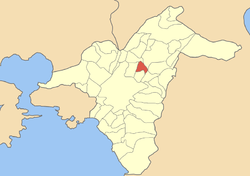Filothei
From Wikipedia, the free encyclopedia
For other uses, see Filothei (disambiguation).
| Filothei Φιλοθέη | |
|---|---|
 Spring 2009 in G Ventiri street. | |
| Location | |
 Filothei | |
| Coordinates | 38°1′N 23°47′E / 38.017°N 23.783°ECoordinates: 38°1′N 23°47′E / 38.017°N 23.783°E |
Location within Athens  | |
| Government | |
| Country: | Greece |
| Administrative region: | Attica |
| Regional unit: | North Athens |
| Municipality: | Filothei-Psychiko |
| Population statistics (as of 2011)[1] | |
| Municipal unit | |
| - Population: | 7,302 |
| - Area: | 2.301 km2 (1 sq mi) |
| - Density: | 3,173 /km2 (8,219 /sq mi) |
| Other | |
| Time zone: | EET/EEST (UTC+2/3) |
| Elevation (center): | 160 m (525 ft) |
| Postal code: | 152 xx |
| Telephone: | 210 |
| Auto: | Z |
| Website | |
| philothei.ichscommunication.gr | |
Filothei (Greek: Φιλοθέη) is a green, affluent northeastern suburb of Athens, Greece, consisting mainly of hillside villas, relatively close to the Olympic Stadium. Since the 2011 local government reform it is part of the municipality Filothei-Psychiko, of which it is a municipal unit.[2]
One of the traditionally rich northern suburbs of Athens, Filothei has been historically home to important people such as politicians and businessmen; it is also home to many of Athens' foreign residents, especially those employed in diplomatic capacities.
Historical population
| Year | Population |
|---|---|
| 1981 | 6,749 |
| 1991 | 8,396 |
| 2001 | 7,310 |
| 2011 | 7,302 |
References
- ↑ Detailed census results 2011 (Greek)
- ↑ Kallikratis law Greece Ministry of Interior (Greek)
External links
- Official website (English) (Greek)
 |
Nea Ionia | Marousi |  | |
| Galatsi | |
Chalandri | ||
| ||||
| | ||||
| Psychiko |
| |||||
This article is issued from Wikipedia. The text is available under the Creative Commons Attribution/Share Alike; additional terms may apply for the media files.